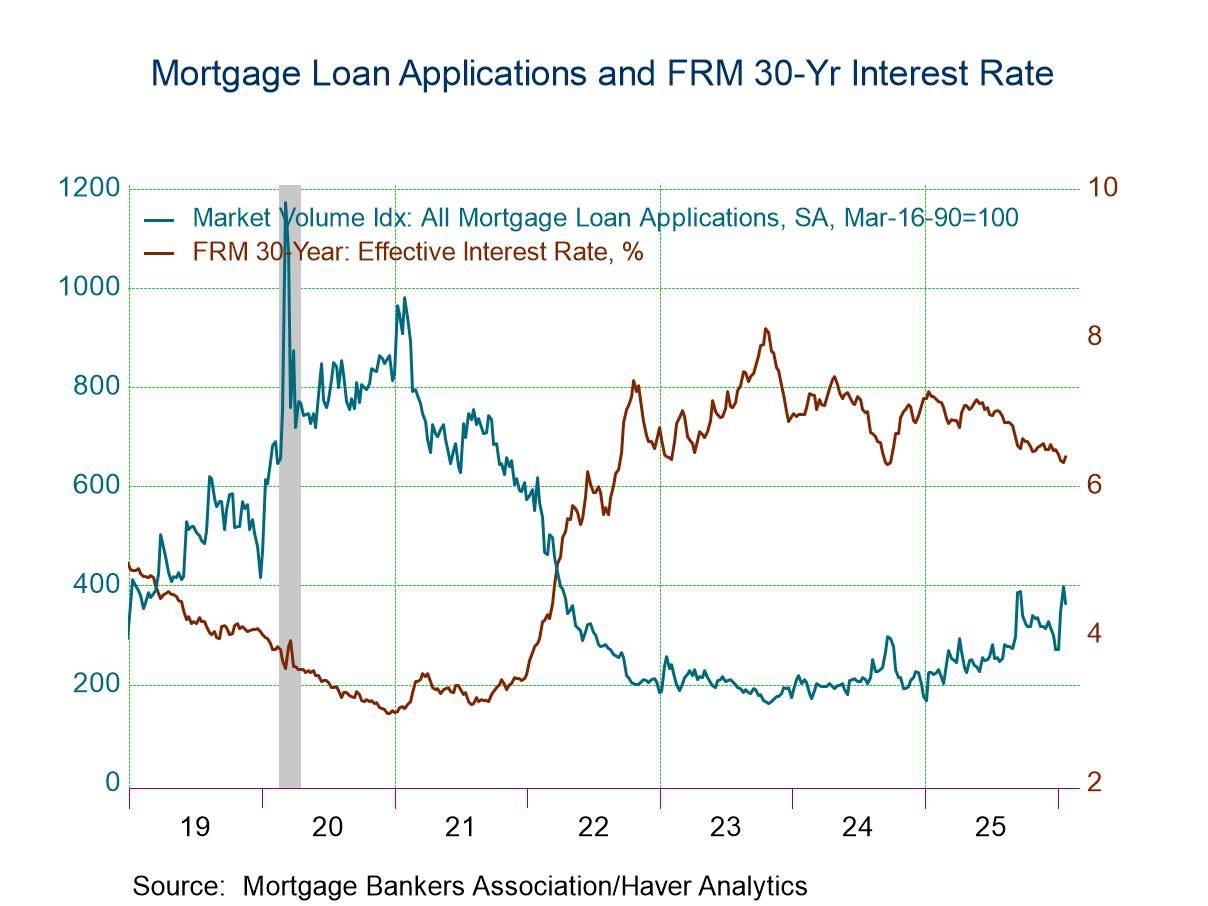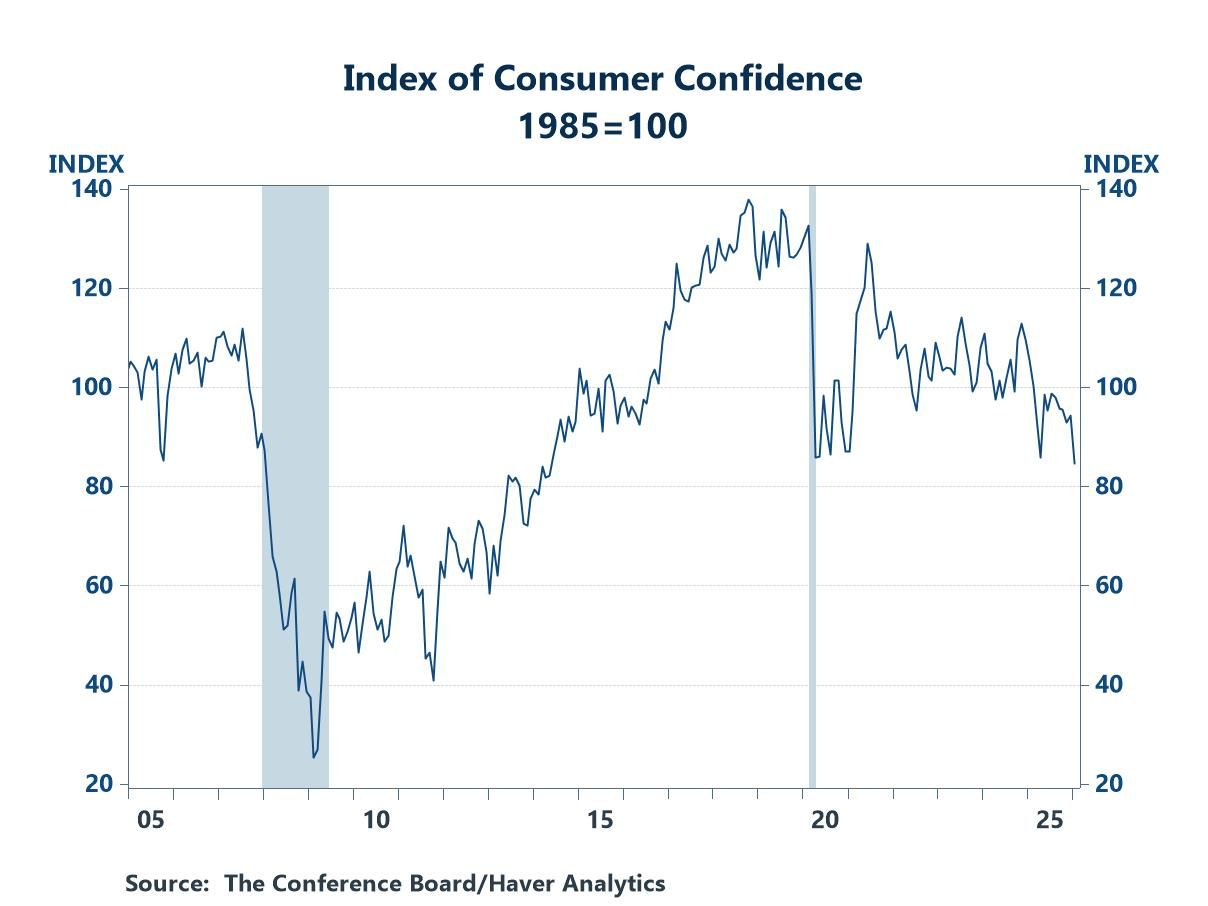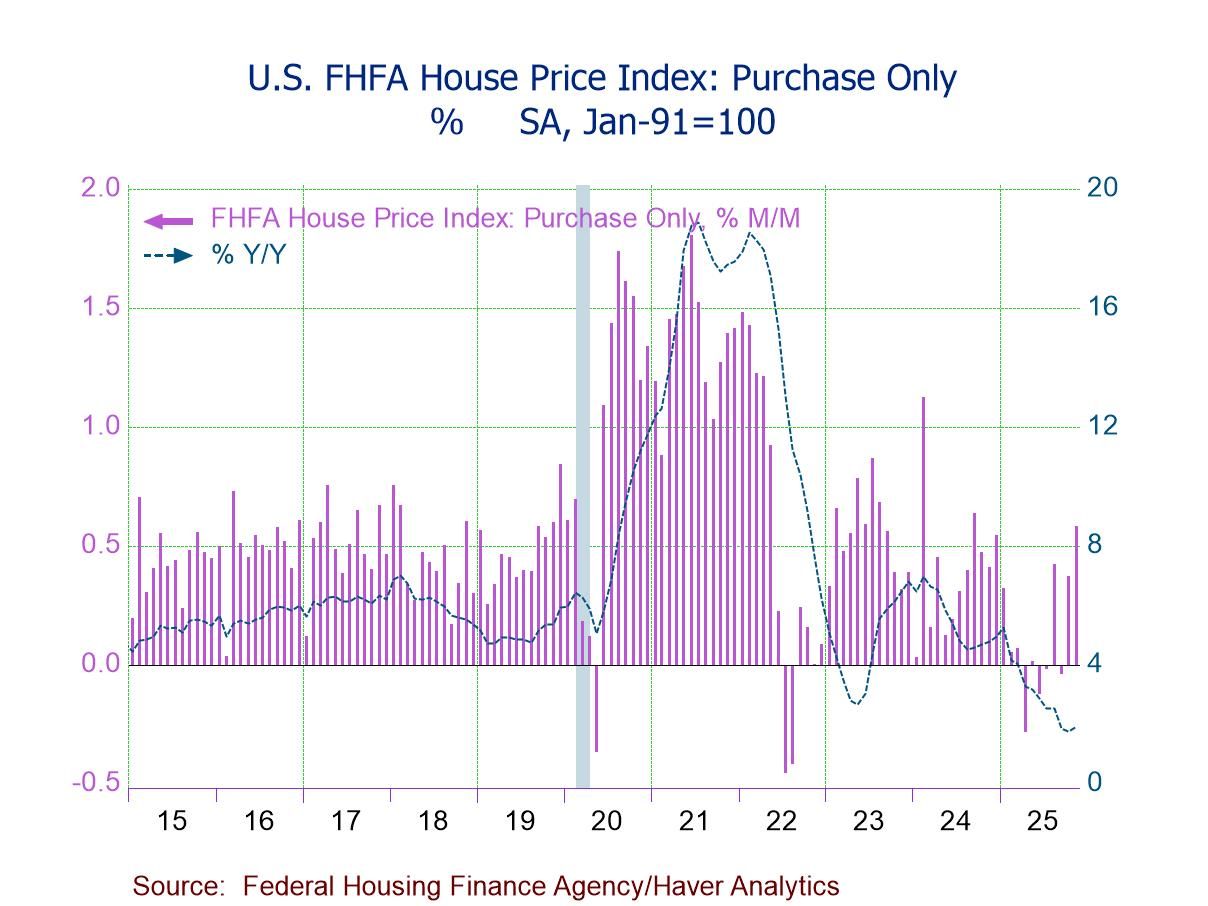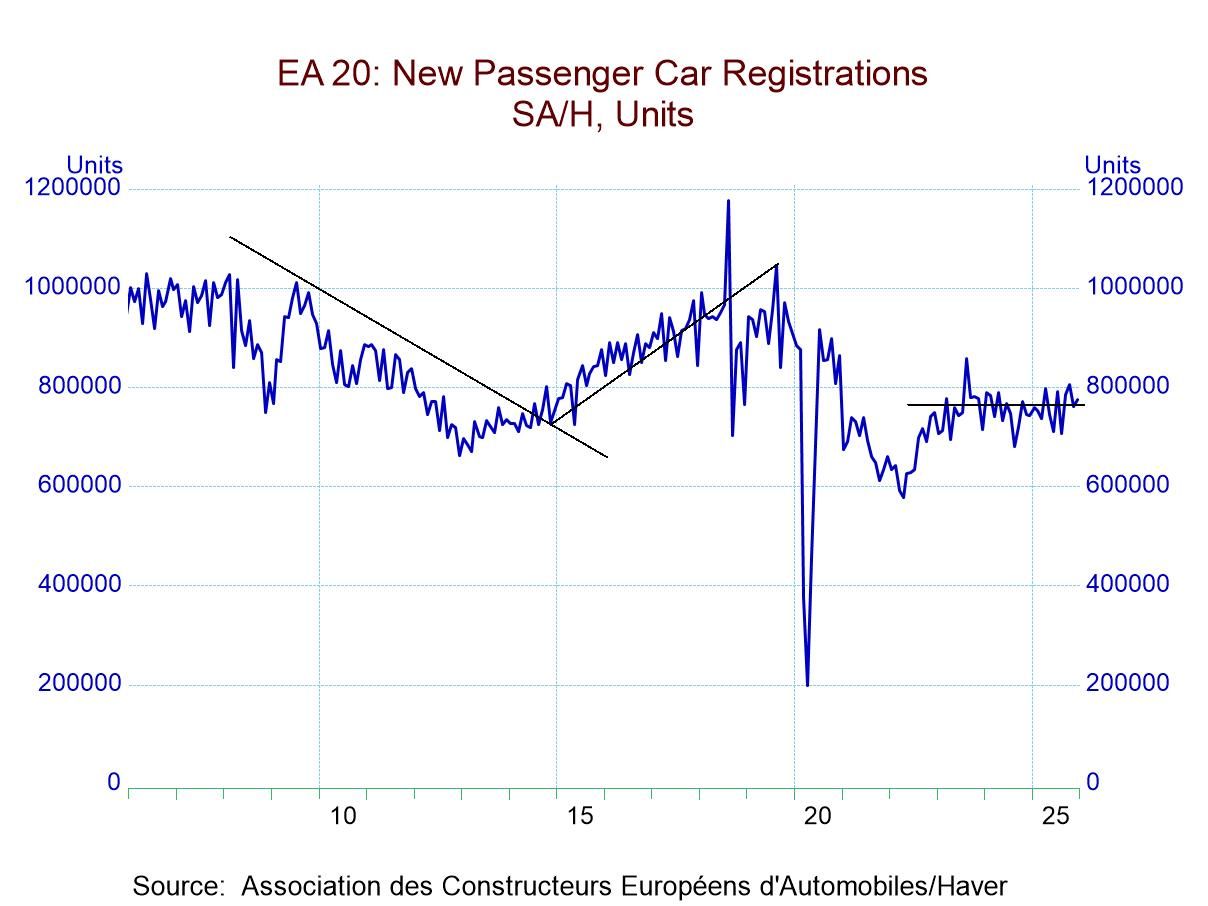 Global| Apr 26 2012
Global| Apr 26 2012EU Commission Indices Weaken In April...For Most
Summary
For the whole of EU, the economic union, not just the monetary bloc, the economic sentiment index was flat in April. But for the monetary union the index fell by 1.7%. The index for Germany fell by 1%, France fell by 0.4% Italy’s [...]
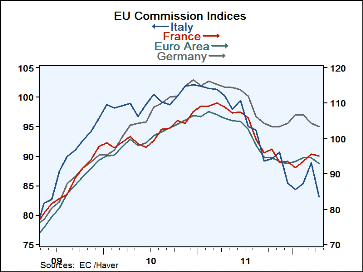 For the whole of EU, the economic union, not just the monetary bloc, the economic sentiment index was flat in April.
But for the monetary union the index fell by 1.7%. The index for Germany fell by 1%, France fell by 0.4% Italy’s index
fell by 6.4% Spain’s fell by 2%. Increasing sentiment indices came from Greece, up 2.1% and up for the second month in
a row and Portugal, up by 1.8%, and up for the fifth month in a row.
For the whole of EU, the economic union, not just the monetary bloc, the economic sentiment index was flat in April.
But for the monetary union the index fell by 1.7%. The index for Germany fell by 1%, France fell by 0.4% Italy’s index
fell by 6.4% Spain’s fell by 2%. Increasing sentiment indices came from Greece, up 2.1% and up for the second month in
a row and Portugal, up by 1.8%, and up for the fifth month in a row.
However, sentiment standings are weak and are very weak with few exceptions. The strong reading is for Germany where it is weaker than its current reading 69% of the time, and stronger only 31% of the time. For the Euro-Area, the reading is weaker only 17% of the time. That pretty much isolates Germany. France is the next best country with a reading that is weaker only 30% of the time. Italy, Spain, Greece and Portugal are weaker than their April readings less 15% of the time. These are very weak reports. Portugal despite a ‘string’ of monthly increases is still weaker than its April reading only 5.1% of the time.
Among the sectors in EU, Consumer confidence is the weakest in its queue as it is weaker only 13% of the time. The EU reading itself is weaker only 20% of the time. The industrial sector remains the relative strongest as it is weaker 45% of the time and is still close to its median value. Retailing is weaker about 38% of the time. Construction and services are weaker less than 30% of the time.
What we see this month is evidence that Europe is weakening and the EMU countries are weaker than the EU countries, evidence that the problems in the Zone are having an impact on Zone members.
While Markit PMI indices give a picture of a rapid unravel in EMU, other readings from the EU Commission as well as from some from previously released national sources, show a more gradual unraveling taking place.
Germany’s overall sentiment index is down strongly over the last two months falling 1% in April after dropping 2.2% in March. But Italy has plunged 6.4% in April after surging by 4.4% in March France is net higher over two months. Neither Greece nor Portugal has seen a decline in three months or more. The Zone is weakening but the pace of it is still uneven.
| EU Sectors and Country level Overall Sentiment | |||||||||||
|---|---|---|---|---|---|---|---|---|---|---|---|
| EU | Apr 12 |
Mar 12 |
Feb 12 |
Jan 12 |
%ile | Rank | Max | Min | Range | Mean | By Q rank% |
| Overall Index | 93.2 | 93.2 | 94 | 92.8 | 53.2 | 202 | 117 | 67 | 50 | 100 | 20.2% |
| Industrial | -7.7 | -7.1 | -5.3 | -7.2 | 67.3 | 139 | 7 | -39 | 46 | -7 | 45.1% |
| Consumer Confid | -20.2 | -19.3 | -20.1 | -20.8 | 35.5 | 219 | 2 | -32 | 34 | -12 | 13.4% |
| Retail | -8.7 | -11.3 | -11.9 | -14 | 52.6 | 157 | 8 | -27 | 34 | -7 | 37.9% |
| Construction | -30 | -29 | -29 | -31 | 32.0 | 179 | 4 | -46 | 50 | -19 | 29.2% |
| Services | -3.7 | -3.5 | -4.4 | -3.2 | 43.2 | 139 | 34 | -32 | 66 | 9 | 25.7% |
| % M/M | Apr-12 | Based on Level | Level | ||||||||
| EMU | -1.7% | -0.1% | 1.2% | 92.8 | 48.6 | 209 | 118 | 69 | 49 | 99 | 17.4% |
| Germany | -1.0% | -2.2% | 0.1% | 103.3 | 69.8 | 100 | 117 | 73 | 44 | 99 | 60.5% |
| France | -0.4% | 2.2% | 2.0% | 95.2 | 48.2 | 175 | 117 | 75 | 43 | 100 | 30.8% |
| Italy | -6.4% | 4.1% | 1.2% | 83.1 | 22.2 | 231 | 121 | 72 | 48 | 100 | 8.7% |
| Spain | -2.0% | -1.2% | -0.2% | 89.1 | 38.9 | 217 | 116 | 72 | 43 | 100 | 14.2% |
| Greece | 2.1% | 1.1% | 0.0% | 77.3 | 12.0 | 238 | 119 | 72 | 48 | 100 | 5.9% |
| Portugal | 1.8% | 1.6% | 0.3% | 78.5 | 16.2 | 240 | 117 | 71 | 46 | 99 | 5.1% |
| Memo:UK | 4.6% | -2.6% | 0.3% | 95.7 | 60.6 | 194 | 116 | 64 | 52 | 101 | 23.3% |
| All since June 1990 | 253-Count | Services: | 187-Count | ||||||||
| Sentiment is an index, sector readings are net balance diffusion measures | |||||||||||
Robert Brusca
AuthorMore in Author Profile »Robert A. Brusca is Chief Economist of Fact and Opinion Economics, a consulting firm he founded in Manhattan. He has been an economist on Wall Street for over 25 years. He has visited central banking and large institutional clients in over 30 countries in his career as an economist. Mr. Brusca was a Divisional Research Chief at the Federal Reserve Bank of NY (Chief of the International Financial markets Division), a Fed Watcher at Irving Trust and Chief Economist at Nikko Securities International. He is widely quoted and appears in various media. Mr. Brusca holds an MA and Ph.D. in economics from Michigan State University and a BA in Economics from the University of Michigan. His research pursues his strong interests in non aligned policy economics as well as international economics. FAO Economics’ research targets investors to assist them in making better investment decisions in stocks, bonds and in a variety of international assets. The company does not manage money and has no conflicts in giving economic advice.



